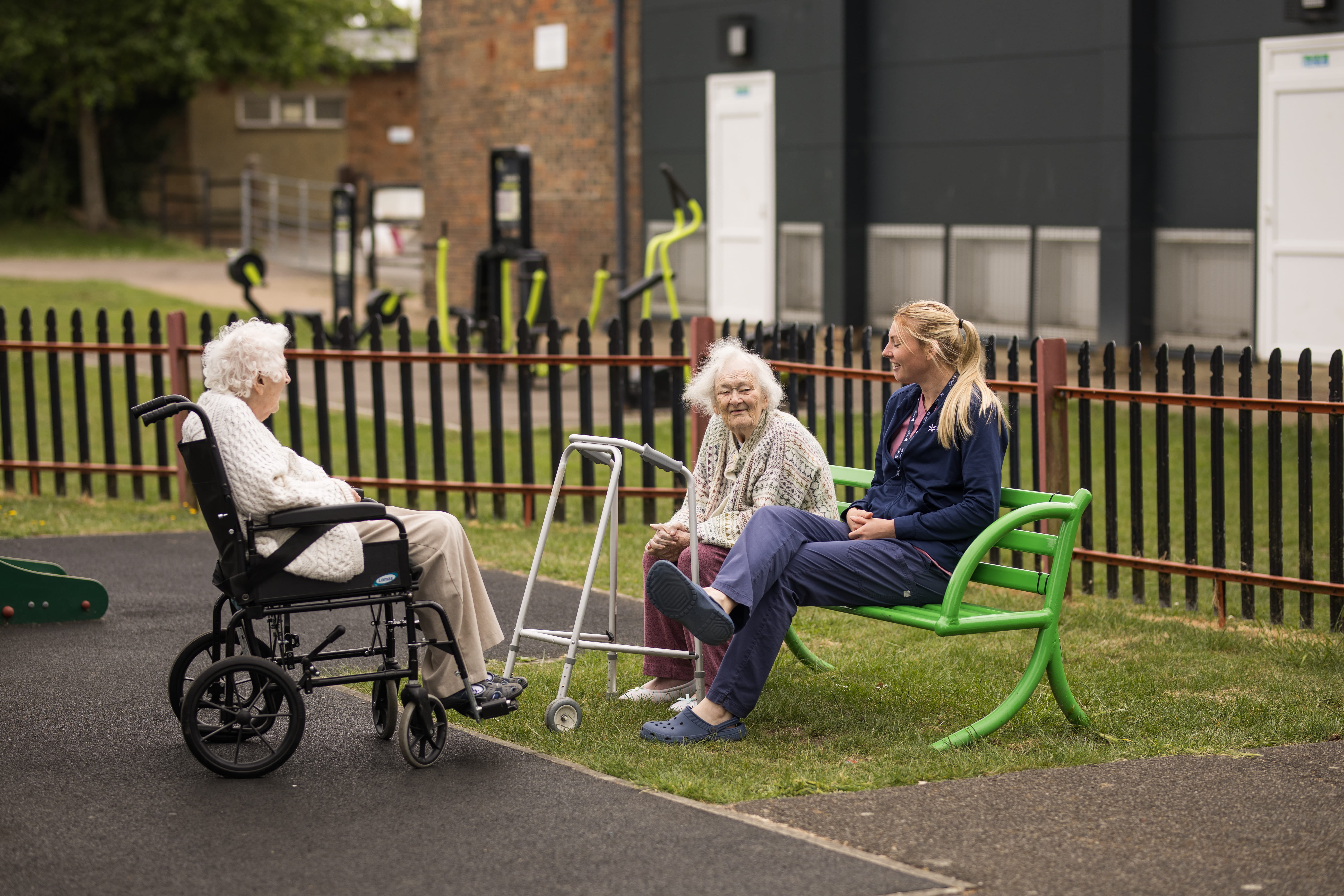As people age, medications often become an integral part of their daily lives. Many older adults take multiple prescriptions for chronic conditions such as high blood pressure, diabetes, arthritis, or heart disease. While these medicines are essential for managing health, they can also bring risks, especially from side effects that may be subtle, confusing, or mistaken for signs of ageing.
Spotting these side effects early can prevent complications, improve quality of life, and even save lives. For carers and families, understanding what to look out for and how to respond forms an essential part of safe home care. This guide explores common medication categories, potential side effects, and practical steps to help ensure older adults remain safe, comfortable, and supported.
Why Older Adults Are More Vulnerable to Medication Side Effects
Older adults are more susceptible to the effects of medications due to age-related changes in the body. These changes mean that medicines that were well tolerated at a younger age may cause more noticeable side effects in later years.
Factors that increase vulnerability include:
- Slower metabolism and clearance: The liver and kidneys may not break down or remove drugs as efficiently, causing them to remain in the body for more extended periods.
- Polypharmacy: Taking multiple medications increases the chance of harmful drug interactions.
- Frailty or chronic conditions: Older adults often have weaker systems, making them more sensitive to even low doses.
- Cognitive changes: Dementia or memory loss can make it more challenging to report side effects accurately.
General Warning Signs to Watch For
Side effects are not always apparent. They may appear gradually or mimic normal ageing, so families and carers need to be alert to subtle changes.
Some of the most critical general warning signs include:
- Unexplained confusion, agitation, or drowsiness that is not part of a known condition.
- Sudden changes in balance or frequent falls that may be linked to a medication side effect.
- Loss of appetite, nausea, or digestive problems that occur after starting a new drug.
- Skin changes such as rashes, itching, or bruising that appear unexpectedly.
- Swelling in the legs, hands, or face that could indicate fluid retention.
- New or worsening fatigue that interferes with daily life.
- Changes in vision or hearing that develop soon after medication changes.
If any of these symptoms appear after a new prescription or dosage adjustment, carers should document them and share concerns with the prescribing doctor.
Side Effects of Common Medication Categories
Different types of medications have distinct side effect profiles. By learning what to watch for in common drug categories, carers can respond quickly and appropriately.
Blood Pressure Medications (Antihypertensives)
Blood pressure medicines are widely prescribed but can sometimes cause troublesome side effects.
Potential issues include:
- Dizziness or fainting, especially when standing up quickly.
- Persistent dry cough (common with ACE inhibitors such as ramipril).
- Swelling in the ankles or feet is often linked to calcium channel blockers (like amlodipine).
- Frequent urination or electrolyte imbalances, especially with diuretics (e.g., furosemide).
Carers should monitor for falls or unsteadiness and encourage slow movements when standing. If advised by a doctor, it is also recommended to check blood pressure at home.
Diabetes Medications
Managing diabetes often involves multiple drugs, each with potential side effects.
Carers should look out for:
- Signs of low blood sugar, such as shaking, sweating, or sudden confusion.
- Stomach upset or diarrhoea, common with metformin.
- Weight changes, which may indicate an imbalance in treatment.
Keeping glucose tablets or quick snacks available and maintaining consistent mealtimes are essential safety strategies.
Cholesterol-Lowering Drugs (Statins)
Statins can be lifesaving but sometimes produce side effects.
Key issues include:
- Muscle aches or weakness, especially new or unexplained pain.
- Digestive problems such as constipation or nausea.
- Liver function changes that are detectable through routine blood tests.
Persistent muscle pain should never be dismissed as simply a result of ageing. You must report it to a healthcare provider promptly.
Painkillers (Analgesics)
Painkillers, including paracetamol, opioids (e.g., morphine), and NSAIDs (e.g., ibuprofen), can cause several complications if not monitored closely.
Possible side effects include:
- Constipation lasting more than a few days.
- Stomach ulcers or black/tarry stools.
- Drowsiness or confusion, particularly with opioids.
- Dependence with long-term opioid use.
Carers should ensure adequate fluids and fibre intake and discuss preventative options such as stool softeners when opioids are prescribed.
Sleep Aids and Anxiety Medications (Sedatives)
Sedatives such as benzodiazepines (e.g., diazepam) are sometimes prescribed for short-term issues but carry risks when used long-term.
Potential side effects include:
- Daytime drowsiness and fatigue.
- Dizziness and balance problems, which can potentially lead to falls.
- Memory loss or confusion.
- Dependence and tolerance over time.
Carers should monitor for increasing forgetfulness or concentration issues and ensure medications are reviewed regularly.
Antidepressants
Antidepressants play a vital role in supporting mental health, but may also cause physical and emotional side effects.
Things to watch for include:
- Nausea or dry mouth, particularly when starting treatment.
- Dizziness, increasing the risk of falls.
- Sleep changes, including insomnia or oversleeping.
- Rare but serious risks of worsening mood or suicidal thoughts.
Encouraging open conversation about mood changes helps carers support safe and effective use.
Blood Thinners (Anticoagulants)
Blood thinners help prevent strokes and clots, but raise the risk of bleeding.
Common side effects include:
- Easy bruising or nosebleeds.
- Prolonged bleeding after minor cuts.
- Blood in urine or stools, or black stools indicating internal bleeding.
Carers should monitor carefully after any fall and seek medical help immediately if a head injury occurs.
The Role of Polypharmacy (Taking Multiple Medications)
Polypharmacy, taking multiple medications at once, makes side effects more likely, especially when drugs interact.
Examples of problematic interactions include:
- Blood pressure medication combined with a sedative, increasing the risk of falls.
- Antidepressants and certain painkillers, which may amplify digestive issues or mood changes.
- Warfarin, which interacts with a wide range of foods, supplements, and other medicines.
To reduce risks, carers should:
- Keep an up-to-date list of all medications, including over-the-counter drugs and supplements.
- Use a single pharmacy so pharmacists can check for interactions.
- Request annual medication reviews with healthcare providers.
Practical Strategies for Carers and Families
Carers play a crucial role in ensuring seniors remain safe. By adopting structured routines, they can spot and address side effects early.
Helpful strategies include:
- Keeping a medication diary: Record doses, times, and any unusual symptoms.
- Using tablet organisers and alarms: Reduce the risk of double doses or missed doses.
- Monitoring behaviour changes: Watch for confusion, agitation, or personality shifts.
- Encouraging regular check-ups: Blood tests and reviews help detect problems early.
- Asking questions: Don’t be afraid to ask if a symptom could be drug-related or if alternatives exist.
If medication management remains challenging, consider reaching out to a home care provider for additional support.
When to Seek Urgent Help
Not all side effects require immediate care, but some do. Carers should recognise red flags that warrant urgent medical attention.
Seek help immediately if you notice:
- Sudden difficulty breathing.
- Chest pain.
- Signs of a severe allergic reaction, such as swelling or wheezy breathing.
- Unexplained bleeding or black stools.
- Sudden confusion, loss of consciousness, or collapse.
When in doubt, it is always better to seek help than to wait.
Case Study: Confusion Mistaken for Dementia
Case studies highlight the importance of considering medications when new symptoms appear. For example, Mrs. Jones, aged 82, began to appear confused and forgetful. Her family suspected dementia. A medication review revealed that her sedative dose was too high, causing drowsiness and poor concentration. After adjusting the dose, her memory improved.
This example demonstrates why carers should never assume cognitive decline is only due to ageing, as it may be linked to medication side effects.
How to Support Older Adults in Reporting Side Effects
Some seniors may minimise or hide symptoms because they fear being a burden or losing independence. Carers help by creating an open, supportive environment.
Ways to encourage reporting include:
- Reassuring that side effect reporting improves health and independence.
- Using simple language when asking about symptoms.
- Involving seniors in decisions about what matters most (e.g., comfort, independence, or fewer tablets).
Building a Safe Medication Routine at Home
Establishing a safe and structured routine reduces risks. A clear system ensures medicines are taken correctly and side effects are monitored.
Carers can support safe routines by:
- Linking medicine times with daily habits like meals or brushing teeth.
- Storing medicines in a visible, well-lit space, away from children.
- Using calendars, apps, or dosette boxes to track adherence.
- Collaborating with healthcare providers and involving seniors in decisions.
As medication needs become more complex, it may be necessary to seek support from a home care service to help with medication management.
Conclusion and Takeaways
Medications are essential to managing health in older adults, but side effects pose real risks if not recognised early. Families and carers should remain observant, record changes, and maintain open communication with healthcare providers.
Key takeaways include:
- Older adults are more vulnerable due to age-related changes and polypharmacy.
- Side effects can mimic the signs of ageing, so caregivers must stay alert to new or unexplained changes.
- Diaries, organisers, and annual reviews are essential tools for safe medication use.
- Urgent symptoms should never be ignored. Early action saves lives.
By combining vigilance, record-keeping, and effective communication, caregivers can ensure that medications remain helpful rather than harmful.








